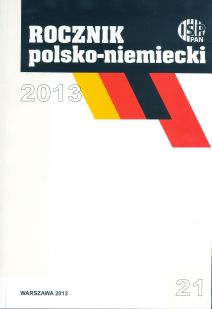Zachodnioniemiecka Federalna Służba Wywiadowcza (BND) o reakcji obywateli NRD na interwencję Wojsk Układu Warszawskiego w Czechosłowacji
The West German Federal Intelligence Service on the reaction of the citizens of the GDR to the Warsaw Pact forces’ intervention in Czechoslovakia
Author(s): Małgorzata ŚwiderSubject(s): Poetry
Published by: Instytut Studiów Politycznych PAN
Keywords: German Democratic Republic; Bundesnachrichtendienst; the Warsaw Pact; intervention in Czechoslovakia
Summary/Abstract: To all intents and purposes, the situation in the German Democratic Republic (GDR) was watched by the Federal Intelligence Service (Bundesnachrichtendienst; BND) from its inception right up until the unifi cation of Germany. Such was also the case in 1968, during the period when reforms were being introduced in Czechoslovakia and the struggle for “socialism with a human face” was being played out. The observation sprang from the disquiet within the government and intelligence service of the Federal Republic of German (FRG) as regards the situation in Czechoslovakia and the GDR, as well as from concerns that the conflict would spread to the other Eastern Bloc countries. There were fears of action being launched against West Berlin and consideration was even given to the possibility of an escalation in tension and the outbreak of World War III. By 23rd August 1968, the BND had already compiled its first report and evaluations of the situation in the ‘Soviet Occupation Zone’ in the context of the intervention by the Warsaw Pact forces. The analyses noted the heated social discussion of the situation in Czechoslovakia and, first and foremost, in respect of the East German army’s participation. The psychological eff ects of the Soviet intervention were examined, as were their long-term implications. The motif of East German society’s objection to the part being played by the GDR in the intervention is evident in the appraisals. Indeed, as of the end of that August, the BND’s daily reports, accounts and analyses were dominated by intelligence on actions directed against the citizens’ discontent and the waves of protest connected with the Warsaw Pact forces’ operations in Czechoslovakia. Time and again, the appraisals compiled by the FRG’s intelligence services also discussed the social consequences of the intervention.
Journal: Rocznik Polsko-Niemiecki / Deutsch-Polnisches Jahrbuch
- Issue Year: 2013
- Issue No: 21
- Page Range: 101-127
- Page Count: 27
- Language: Polish

